CATTI三级笔译实务练习题:经济大萧条.doc
- 格式:doc
- 大小:36.00 KB
- 文档页数:11
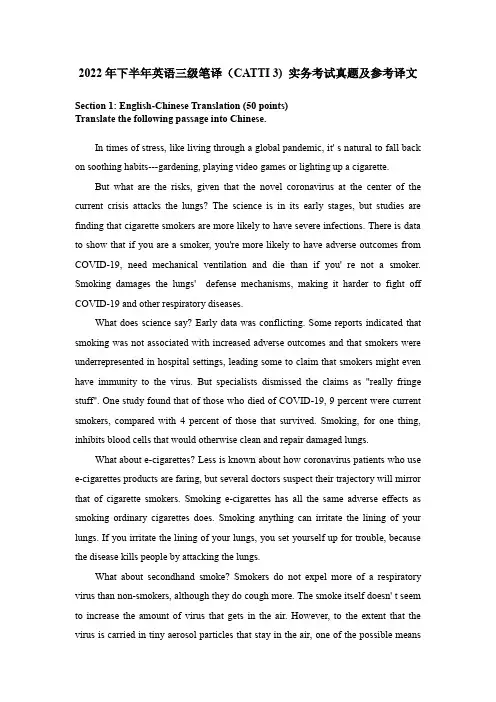
2022年下半年英语三级笔译(CATTI 3) 实务考试真题及参考译文Section 1: English-Chinese Translation (50 points)Translate the following passage into Chinese.In times of stress, like living through a global pandemic, it' s natural to fall back on soothing habits---gardening, playing video games or lighting up a cigarette.But what are the risks, given that the novel coronavirus at the center of the current crisis attacks the lungs? The science is in its early stages, but studies are finding that cigarette smokers are more likely to have severe infections. There is data to show that if you are a smoker, you're more likely to have adverse outcomes from COVID-19, need mechanical ventilation and die than if you' re not a smoker. Smoking damages the lungs' defense mechanisms, making it harder to fight off COVID-19 and other respiratory diseases.What does science say? Early data was conflicting. Some reports indicated that smoking was not associated with increased adverse outcomes and that smokers were underrepresented in hospital settings, leading some to claim that smokers might even have immunity to the virus. But specialists dismissed the claims as "really fringe stuff". One study found that of those who died of COVID-19, 9 percent were current smokers, compared with 4 percent of those that survived. Smoking, for one thing, inhibits blood cells that would otherwise clean and repair damaged lungs.What about e-cigarettes? Less is known about how coronavirus patients who use e-cigarettes products are faring, but several doctors suspect their trajectory will mirror that of cigarette smokers. Smoking e-cigarettes has all the same adverse effects as smoking ordinary cigarettes does. Smoking anything can irritate the lining of your lungs. If you irritate the lining of your lungs, you set yourself up for trouble, because the disease kills people by attacking the lungs.What about secondhand smoke? Smokers do not expel more of a respiratory virus than non-smokers, although they do cough more. The smoke itself doesn' t seem to increase the amount of virus that gets in the air. However, to the extent that the virus is carried in tiny aerosol particles that stay in the air, one of the possible meansof transmission, the smoke shows where those particles are located. One study showed that people who had been exposed to second hand smoke were more likely to contract tuberculosis and, once they got it, didn' t do as well as those who weren' t exposed to smoke. In terms of these immune-suppressive effects, as it relates to tuberculosis, secondhand smoke has adverse effects.Each virus has its unique pattern of dispersion, and scientists are starting to get a handle on how the novel coronavirus behaves. This understanding is making it possible to rank the risks of different activities from high to low to trivial.The two drivers of the spread of the disease are close contact and crowding in closed spaces, as the virus is mainly transmitted through respiratory droplets and close contact. It spreads through homeless shelter and nursing homes, where people are crowded in with many others. And it spreads through people's households. Scientists have found some trends. For example, spending time dining together or being on public transport might increase the risk of spreading or contracting the disease, while going to a market briefly for five minutes or a transient encounter while you walk or run past someone is considered low risk.The studies were all done through contact tracing, which may turn out to be humanity's greatest strategy for fighting the COVID-19 pandemic. Contact tracing can stop chains of transmission, even after a disease is widespread. Another major benefit is that it offers clues as to how the disease spreads. Each virus has its unique pattern.【参考译文】:适逢直面重重压力之际,恰似人类正身陷于这一场席卷全球的新冠肺炎疫情之图圄。
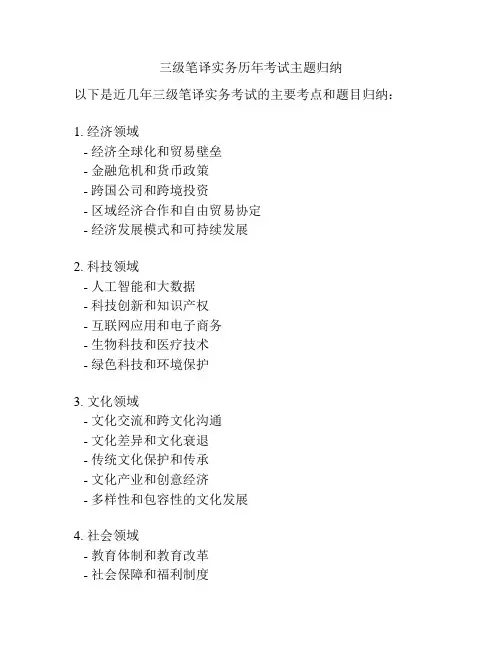
三级笔译实务历年考试主题归纳
以下是近几年三级笔译实务考试的主要考点和题目归纳:
1. 经济领域
- 经济全球化和贸易壁垒
- 金融危机和货币政策
- 跨国公司和跨境投资
- 区域经济合作和自由贸易协定
- 经济发展模式和可持续发展
2. 科技领域
- 人工智能和大数据
- 科技创新和知识产权
- 互联网应用和电子商务
- 生物科技和医疗技术
- 绿色科技和环境保护
3. 文化领域
- 文化交流和跨文化沟通
- 文化差异和文化衰退
- 传统文化保护和传承
- 文化产业和创意经济
- 多样性和包容性的文化发展
4. 社会领域
- 教育体制和教育改革
- 社会保障和福利制度
- 少数民族和社会平等
- 城市化和城市规划
- 社会问题和社会风险
5. 政治领域
- 国际关系和国际合作
- 政治体制和政治改革
- 民主制度和人权保护
- 反恐与国家安全
- 跨国治理和全球议程
以上仅是近年来三级笔译实务考试的一些主要考点和题目,具体考试内容还需根据实际情况进行备考。
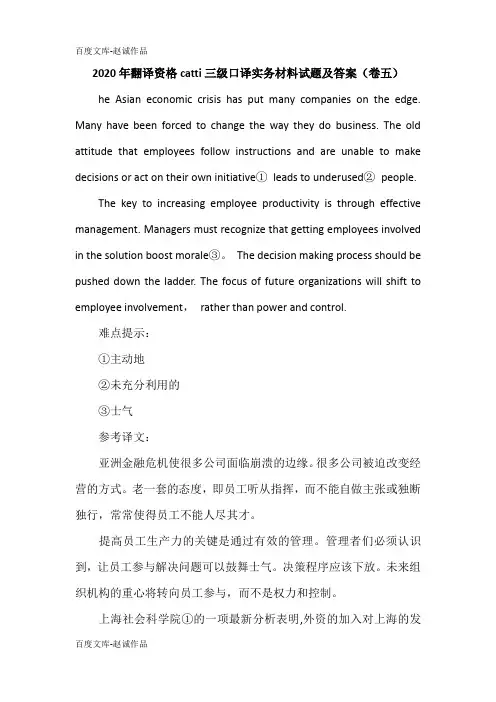
2020年翻译资格catti三级口译实务材料试题及答案(卷五)he Asian economic crisis has put many companies on the edge. Many have been forced to change the way they do business. The old attitude that employees follow instructions and are unable to make decisions or act on their own initiative①leads to underused②people.The key to increasing employee productivity is through effective management. Managers must recognize that getting employees involved in the solution boost morale③。
The decision making process should be pushed down the ladder. The focus of future organizations will shift to employee involvement,rather than power and control.难点提示:①主动地②未充分利用的③士气参考译文:亚洲金融危机使很多公司面临崩溃的边缘。
很多公司被迫改变经营的方式。
老一套的态度,即员工听从指挥,而不能自做主张或独断独行,常常使得员工不能人尽其才。
提高员工生产力的关键是通过有效的管理。
管理者们必须认识到,让员工参与解决问题可以鼓舞士气。
决策程序应该下放。
未来组织机构的重心将转向员工参与,而不是权力和控制。
上海社会科学院①的一项最新分析表明,外资的加入对上海的发展和上海市民的生活产生了巨大影响.这项分析预测,从2002年起,世界主要经济强国在上海的直接投资将急剧上升.过去几年来突飞猛进的发展形势使很多人相信上海是国际投资可靠的港口.中国人民银行上海分行的统据数据表明,到2001年年底,上海的海外金融机构达到65家,其中54家是外国银行.上海的外国银行的总资产②、储蓄存款和贷款平衡差额③占中国所有外国银行总和的一半以上.到目前为止,世界排名前50位的银行中有八家已经在上海建立了分行.难点提示:①the Shanghai Academy of Social Sciences②total asset③loan balance参考译文The latest analysis of the Shanghai Academy of Social Sciences shows that the introduction of foreign capital has produced a tremendous influence on Shanghai's development and the livelihood of its citizens. It predicts that Shanghai will witness an upsurge in direct investment from the world's major economic powers from 2002. The rapid development over the past few years has made many believe that Shanghai is a sound port for international capital.Statistics of the People's Bank of China Shanghai Branch showed that, by the end of 2001, the number of overseas financial institutions inShanghai had reached 65, of which 54 were foreign banks. The total assets, savings deposits and loan balance of foreign banks in Shanghai account for more than half of the total of foreign banks in China. So far, 8 of the world's top 50 banks have set up branches in ShanghaiThe "standard of living" of a country means the average person' s②share of the goods and services which the country produces. A country' s standard of living, therefore, depends first and foremost on its capacity to produce wealth. "Wealth" in this sense is not money, for we do not live on ②money but on things that money can buy: "goods" such as food and clothing, and "services" such as transport and entertainment.A country's capacity to produce wealth depends upon many factors, most of which have an effect on one another. Wealth depends to a great extent upon a country's natural resources, such as coal, gold, and other minerals, water supply and so on. Some regions of the world are well supplied with coal and minerals, and have a fertile soil and a favorable climate; other regions possess none of them.难点提示:①一般人,老百姓②靠……为生参考译文:任何一个国家的生活水平,指的是那个国家生产的产品和提供的服务为普通老百姓分享的情况.因此,一个国家的生活水平,首先取决于它创造财富的能力.在这个意义上,财富并不是指金钱,因为我们生存靠的不是钱,而是靠钱能买到的东西:比如食物和衣服这些"产品",交通和娱乐这些"服务".一个国家创造财富的能力取决于很多因素,其中大部分因素相互作用.财富在很大程度上依赖于一个国家的自然资源,比如煤矿、金矿和其他矿物质、水源等等.世界上有些地区煤矿和矿物质的储量丰富,土壤肥沃,气候适宜,其他地区却一样都不具备。
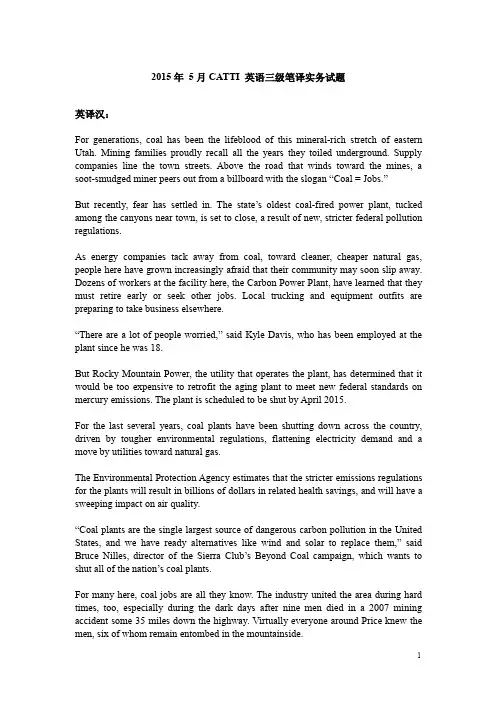
2015年5月CATTI英语三级笔译实务试题英译汉:For generations,coal has been the lifeblood of this mineral-rich stretch of eastern Utah.Mining families proudly recall all the years they toiled underground.Supply companies line the town streets.Above the road that winds toward the mines,a soot-smudged miner peers out from a billboard with the slogan“Coal=Jobs.”But recently,fear has settled in.The state’s oldest coal-fired power plant,tucked among the canyons near town,is set to close,a result of new,stricter federal pollution regulations.As energy companies tack away from coal,toward cleaner,cheaper natural gas, people here have grown increasingly afraid that their community may soon slip away. Dozens of workers at the facility here,the Carbon Power Plant,have learned that they must retire early or seek other jobs.Local trucking and equipment outfits are preparing to take business elsewhere.“There are a lot of people worried,”said Kyle Davis,who has been employed at the plant since he was18.But Rocky Mountain Power,the utility that operates the plant,has determined that it would be too expensive to retrofit the aging plant to meet new federal standards on mercury emissions.The plant is scheduled to be shut by April2015.For the last several years,coal plants have been shutting down across the country, driven by tougher environmental regulations,flattening electricity demand and a move by utilities toward natural gas.The Environmental Protection Agency estimates that the stricter emissions regulations for the plants will result in billions of dollars in related health savings,and will have a sweeping impact on air quality.“Coal plants are the single largest source of dangerous carbon pollution in the United States,and we have ready alternatives like wind and solar to replace them,”said Bruce Nilles,director of the Sierra Club’s Beyond Coal campaign,which wants to shut all of the nation’s coal plants.For many here,coal jobs are all they know.The industry united the area during hard times,too,especially during the dark days after nine men died in a2007mining accident some35miles down the highway.Virtually everyone around Price knew the men,six of whom remain entombed in the mountainside.But there is quiet acknowledgment that Carbon County will have to change—if not now,soon.Pete Palacios,who worked in the mines for43years,has seen coal roar and fade here. Now86,his eyes grew cloudy as he recalled his first mining job.He was12,and earned$1a day.“I’m retired,so I’ll be fine.But these young guys?”Pete Palacios said,his voice trailing off.汉译英:天柱县位于贵州省东部,是川渝黔通往两广、江浙的重要门户。
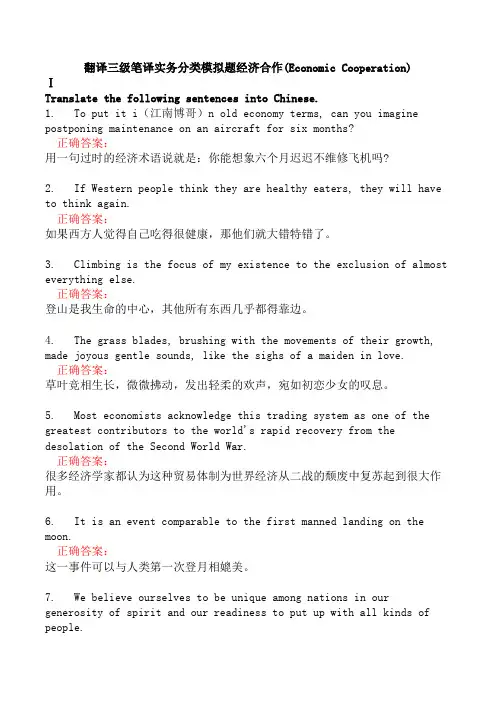
翻译三级笔译实务分类模拟题经济合作(Economic Cooperation)ⅠTranslate the following sentences into Chinese.1. To put it i(江南博哥)n old economy terms, can you imagine postponing maintenance on an aircraft for six months?正确答案:用一句过时的经济术语说就是:你能想象六个月迟迟不维修飞机吗?2. If Western people think they are healthy eaters, they will have to think again.正确答案:如果西方人觉得自己吃得很健康,那他们就大错特错了。
3. Climbing is the focus of my existence to the exclusion of almost everything else.正确答案:登山是我生命的中心,其他所有东西几乎都得靠边。
4. The grass blades, brushing with the movements of their growth, made joyous gentle sounds, like the sighs of a maiden in love.正确答案:草叶竞相生长,微微拂动,发出轻柔的欢声,宛如初恋少女的叹息。
5. Most economists acknowledge this trading system as one of the greatest contributors to the world's rapid recovery from the desolation of the Second World War.正确答案:很多经济学家都认为这种贸易体制为世界经济从二战的颓废中复苏起到很大作用。
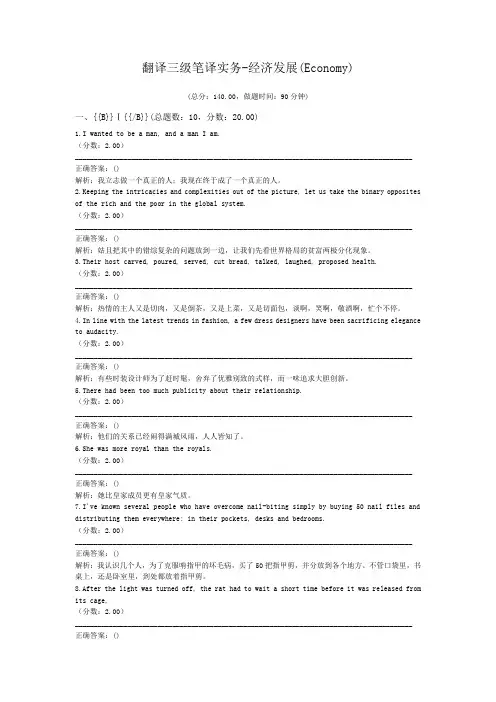
翻译三级笔译实务-经济发展(Economy)(总分:140.00,做题时间:90分钟)一、{{B}}Ⅰ{{/B}}(总题数:10,分数:20.00)1.I wanted to be a man, and a man I am.(分数:2.00)__________________________________________________________________________________________ 正确答案:()解析:我立志做一个真正的人;我现在终于成了一个真正的人。
2.Keeping the intricacies and complexities out of the picture, let us take the binary opposites of the rich and the poor in the global system.(分数:2.00)__________________________________________________________________________________________ 正确答案:()解析:姑且把其中的错综复杂的问题放到一边,让我们先看世界格局的贫富两极分化现象。
3.Their host carved, poured, served, cut bread, talked, laughed, proposed health.(分数:2.00)__________________________________________________________________________________________ 正确答案:()解析:热情的主人又是切肉,又是倒茶,又是上菜,又是切面包,谈啊,笑啊,敬酒啊,忙个不停。
4.In line with the latest trends in fashion, a few dress designers have been sacrificing elegance to audacity.(分数:2.00)__________________________________________________________________________________________ 正确答案:()解析:有些时装设计师为了赶时髦,舍弃了优雅别致的式样,而一味追求大胆创新。
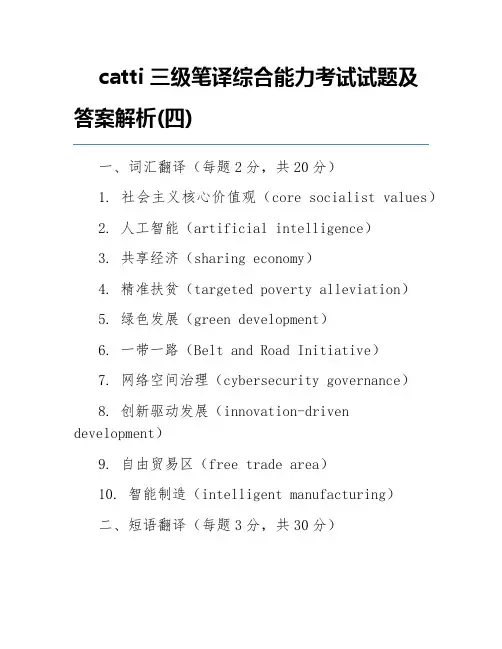
catti三级笔译综合能力考试试题及答案解析(四)一、词汇翻译(每题2分,共20分)1. 社会主义核心价值观(core socialist values)2. 人工智能(artificial intelligence)3. 共享经济(sharing economy)4. 精准扶贫(targeted poverty alleviation)5. 绿色发展(green development)6. 一带一路(Belt and Road Initiative)7. 网络空间治理(cybersecurity governance)8. 创新驱动发展(innovation-driven development)9. 自由贸易区(free trade area)10. 智能制造(intelligent manufacturing)二、短语翻译(每题3分,共30分)11. 全面建设社会主义现代化国家(comprehensively build a socialist modern country)12. 脱贫攻坚战(the fight against poverty)13. 互联网+(Internet+)14. 新型大国关系(a new type of major-country relationship)15. 人民币国际化(renminbi internationalization)16. 智慧城市(smart city)17. 社会主义核心价值观教育(education on core socialist values)18. 生态补偿(ecological compensation)19. 中华民族优秀传统文化(the excellent traditional Chinese culture)20. 公平竞争(fair competition)三、篇章翻译(40分)请将以下中文文章翻译成英文:随着我国经济社会发展,人们的生活方式发生了翻天覆地的变化。
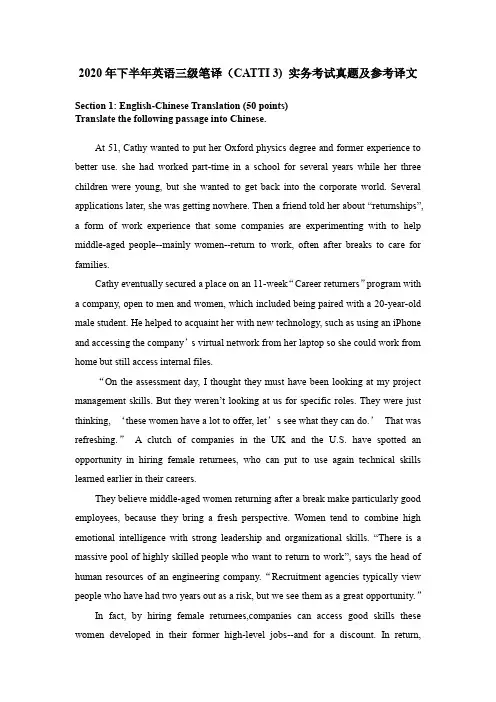
2020年下半年英语三级笔译(CATTI 3) 实务考试真题及参考译文Section 1: English-Chinese Translation (50 points)Translate the following passage into Chinese.At 51, Cathy wanted to put her Oxford physics degree and former experience to better use. she had worked part-time in a school for several years while her three children were young, but she wanted to get back into the corporate world. Several applications later, she was getting nowhere. Then a friend told her about “returnships”, a form of work experience that some companies are experimenting with to help middle-aged people--mainly women--return to work, often after breaks to care for families.Cathy eventually secured a place on an 11-week“Career returners”program with a company, open to men and women, which included being paired with a 20-year-old male student. He helped to acquaint her with new technology, such as using an iPhone and accessing the company’s virtual network from her laptop so she could work from home but still access internal files.“On the assessment day, I thought they must have been looking at my project management skills. But they weren’t looking at us for specific roles. They were just thinking, ‘these women have a lot to offer, let’s see what they can do.’That was refreshing.” A clutch of companies in the UK and the U.S. have spotted an opportunity in hiring female returnees, who can put to use again technical skills learned earlier in their careers.They believe middle-aged women returning after a break make particularly good employees, because they bring a fresh perspective. Women tend to combine high emotional intelligence with strong leadership and organizational skills. “There is a massive pool of highly skilled people who want to return to work”, says the head of human resources of an engineering company.“Recruitment agencies typically view people who have had two years out as a risk, but we see them as a great opportunity.”In fact, by hiring female returnees,companies can access good skills these women developed in their former high-level jobs--and for a discount. In return,employers coach these middle-aged females back into working life. Through her returnship, Cathy gained a full-time role as an operations data consultant. She still is earning less than she would like to, “but it’s a foot in the door and the salary is up for review in six months,”she says. It is still overwhelmingly women who stay home to care for young children. UK government figures show that women account for around 90 percent of people on career breaks for caring reasons. A lack of middle-aged women working, particularly in high skilled roles, is costing the UK economy £50 billion a year, according to a report. The report found that men over 50 took home nearly two-thirds of the total wages paid out to everyone in that age range in 2015. It blamed the pay gap on the low-skilled, part-time roles middle-aged women often accept. Some 40 percent of women in work in the UK do so part-time, as opposed to only 11 percent of men. This issue is not restricted to the UK. A study last year by economists found “strong evidence of age discrimination in hiring against older women”in a range of white- and blue-collar jobs. The data show that it is harder for middle-aged women to find jobs than it is for middle-aged men, regardless of whether they have taken a break from working.【参考译文】:51岁的凯茜希望更好地利用她的牛津大学物理学学位以及先前的工作经验。
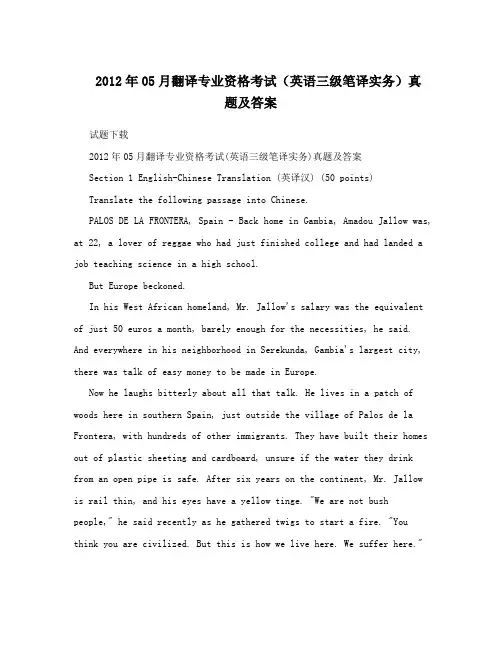
2012年05月翻译专业资格考试(英语三级笔译实务)真题及答案试题下载2012年05月翻译专业资格考试(英语三级笔译实务)真题及答案Section 1 English-Chinese Translation (英译汉) (50 points)Translate the following passage into Chinese.PALOS DE LA FRONTERA, Spain - Back home in Gambia, Amadou Jallow was, at 22, a lover of reggae who had just finished college and had landed a job teaching science in a high school.But Europe beckoned.In his West African homeland, Mr. Jallow's salary was the equivalent of just 50 euros a month, barely enough for the necessities, he said. And everywhere in his neighborhood in Serekunda, Gambia's largest city, there was talk of easy money to be made in Europe.Now he laughs bitterly about all that talk. He lives in a patch of woods here in southern Spain, just outside the village of Palos de la Frontera, with hundreds of other immigrants. They have built their homes out of plastic sheeting and cardboard, unsure if the water they drink from an open pipe is safe. After six years on the continent, Mr. Jallow is rail thin, and his eyes have a yellow tinge. "We are not bush people," he said recently as he gathered twigs to start a fire. "Youthink you are civilized. But this is how we live here. We suffer here."The political upheaval in Libya and elsewhere in North Africa has opened the way for thousands of new migrants to make their way to Europe across the Mediterranean. Already some 25,000 have reached the island of Lampedusa, Italy, and hundreds more have arrived at Malta.The boats, at first, brought mostly Tunisians. But lately there have been more sub-Saharans.Experts say thousands more - many of whom have been moving aroundNorth Africa trying to get to Europe for years, including Somalis, Eritreans, Senegalese and Nigerians - are likely to follow, sure that a better life awaits them.But for Mr. Jallow and for many others who arrived before them,often after days at sea without food or water, Europe has offered hardships they never imagined. These days Mr. Jallow survives on two meals a day, mostly a leaden paste made from flour and oil, which hestirs with a branch."It keeps the hunger away," he said.The authorities estimate that there are perhaps 10,000 immigrantsliving in the woods in the southern Spanish province of Andalusia, a region known for its crops of strawberries, raspberries and blueberries, and there are thousands more migrants in areas that produce olives, oranges and vegetables. Most of them have stories that echo Mr. Jallow's.From the road, their encampments look like igloos tucked among the trees. Up close, the squalor is clear. Piles of garbage and flies are everywhere. Old clothes, stiff from dirt and rain, hang from branches."There is everything in there," said Diego Canamero, the leader of the farm workers' union in Andalusia, which tries to advocate for the men. "You have rats and snakes and mice and fleas."The men in the woods do not call home with the truth, though. They send pictures of themselves posing next to Mercedes cars parked on the street, the kind of pictures that Mr. Jallow says he fell for so many years ago. Now he shakes his head toward his neighbors,1试题下载who will not talk to reporters."So many lies," he said. "It is terrible what they are doing. But they are embarrassed."Even now, though, Mr. Jallow will not consider going back to Gambia. "I would prefer to die here," he said. "I cannot go home empty-handed. If I went home, they would be saying, "What have you been doing with yourself, Amadou?' They think in Europe there is money all over."The immigrants - virtually all of them are men - cluster by nationality and look for work on the farms. But Mr. Cafiamero says they are offered only the least desirable work, like handling pesticides, and little of it at that. Most have no working papers.Occasionally, the police bring bulldozers to tear down the shelters. But the men, who have usually used their family's life savings to get here, are mostly left alone - the conditions they live under are an open secret in the nearby villages.答案:西班牙帕洛斯德拉弗龙特拉((在冈比亚国内时,阿玛窦?雅罗(Amadoujallow)曾是个雷鬼乐迷,22岁那年他刚刚大学毕业,在国内一所高中还谋得了科学教职。
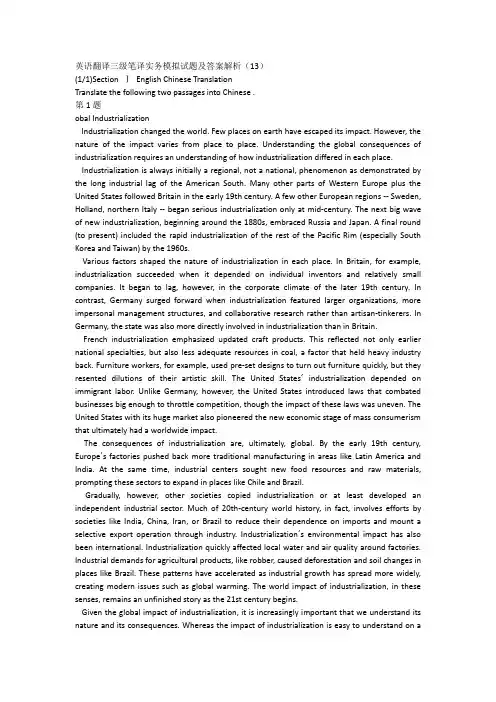
英语翻译三级笔译实务模拟试题及答案解析(13)(1/1)Section ⅠEnglish Chinese TranslationTranslate the following two passages into Chinese .第1题obal IndustrializationIndustrialization changed the world. Few places on earth have escaped its impact. However, the nature of the impact varies from place to place. Understanding the global consequences of industrialization requires an understanding of how industrialization differed in each place.Industrialization is always initially a regional, not a national, phenomenon as demonstrated by the long industrial lag of the American South. Many other parts of Western Europe plus the United States followed Britain in the early 19th century. A few other European regions -- Sweden, Holland, northern Italy -- began serious industrialization only at mid-century. The next big wave of new industrialization, beginning around the 1880s, embraced Russia and Japan. A final round (to present) included the rapid industrialization of the rest of the Pacific Rim (especially South Korea and Taiwan) by the 1960s.Various factors shaped the nature of industrialization in each place. In Britain, for example, industrialization succeeded when it depended on individual inventors and relatively small companies. It began to lag, however, in the corporate climate of the later 19th century. In contrast, Germany surged forward when industrialization featured larger organizations, more impersonal management structures, and collaborative research rather than artisan-tinkerers. In Germany, the state was also more directly involved in industrialization than in Britain.French industrialization emphasized updated craft products. This reflected not only earlier national specialties, but also less adequate resources in coal, a factor that held heavy industry back. Furniture workers, for example, used pre-set designs to turn out furniture quickly, but they resented dilutions of their artistic skill. The United States´industrialization depended on immigrant labor. Unlike Germany, however, the United States introduced laws that combated businesses big enough to throttle competition, though the impact of these laws was uneven. The United States with its huge market also pioneered the new economic stage of mass consumerism that ultimately had a worldwide impact.The consequences of industrialization are, ultimately, global. By the early 19th century, Europe´s factories pushed back more traditional manufacturing in areas like Latin America and India. At the same time, industrial centers sought new food resources and raw materials, prompting these sectors to expand in places like Chile and Brazil.Gradually, however, other societies copied industrialization or at least developed an independent industrial sector. Much of 20th-century world history, in fact, involves efforts by societies like India, China, Iran, or Brazil to reduce their dependence on imports and mount a selective export operation through industry. Industrialization´s environmental impact has also been international. Industrialization quickly affected local water and air quality around factories. Industrial demands for agricultural products, like robber, caused deforestation and soil changes in places like Brazil. These patterns have accelerated as industrial growth has spread more widely, creating modern issues such as global warming. The world impact of industrialization, in these senses, remains an unfinished story as the 21st century begins.Given the global impact of industrialization, it is increasingly important that we understand its nature and its consequences. Whereas the impact of industrialization is easy to understand on apersonal level -- how it affects where and how we work or live our lives -- it is more difficult to understand its nature on a global level, particularly when its global pattern is so complex. History provides a means toward this understanding. By understanding the causes, the variations, and the historic consequences of the Industrial Revolution, we can better understand our present circumstances and, hopefully, shape future industrializations for the good. _____下一题(1/1)Section ⅡChinese-English TranslationTranslate the following passage into English .第2题贸易保护主义考验全球经济2000年全球共有反倾销案251起,略高于20世纪90年代年均232起的数字。
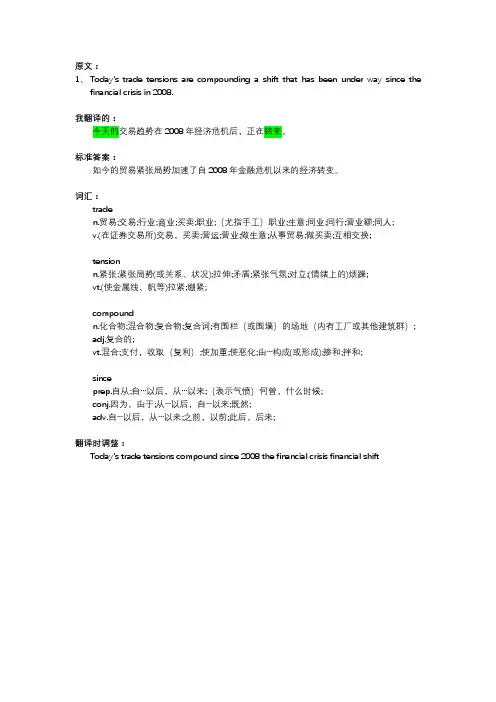
1、Today’s trade tensions are compounding a shift that has been under way since thefinancial crisis in 2008.我翻译的:今天的交易趋势在2008年经济危机后,正在转变。
标准答案:如今的贸易紧张局势加速了自2008年金融危机以来的经济转变。
词汇:traden.贸易;交易;行业;商业;买卖;职业;(尤指手工)职业;生意;同业;同行;营业额;同人;v.(在证券交易所)交易,买卖;营运;营业;做生意;从事贸易;做买卖;互相交换;tensionn.紧张;紧张局势(或关系、状况);拉伸;矛盾;紧张气氛;对立;(情绪上的)烦躁;vt.(使金属线、帆等)拉紧;绷紧;compoundn.化合物;混合物;复合物;复合词;有围栏(或围墙)的场地(内有工厂或其他建筑群);adj.复合的;vt.混合;支付,收取(复利);使加重;使恶化;由…构成(或形成);掺和;拌和;sinceprep.自从;自…以后,从…以来;(表示气愤)何曾,什么时候;conj.因为,由于;从…以后,自…以来;既然;adv.自…以后,从…以来;之前,以前;此后,后来;翻译时调整:Today’s trade tensions compound since 2008 the financial crisis financial shift2、Cross-border investment, trade, bank loans and supply chains have all been shrinking orstagnating relative to world GDP.我翻译的:跨境投资、贸易、银行贷款和供应链全都紧密关联着全球GDP。
标准答案:相对全球国内生产总值而言,跨境投资和贸易、银行贷款和供应链都处于萎缩或停滞状态。
词汇:shrinkv.收缩;缩小;(使)减少;(使)缩水;退缩;畏缩;皱缩;n.精神病学家;心理学家;stagnatevi.停滞;不发展;不进步;因不流动而变得污浊;relative to相对于;关于…的,和…比较起来;翻译时调整:relative to world GDP,Cross-border investment, trade, bank loans and supply chains shrink or stagnate.。
2005年11月13日三级笔译实务试题英译汉The Gap Between Rich and Poor Widened in U.S. CapitalWashington D.C. ranks first among the 40 cities with the widest gap between the poor and the rich, according to a recent report released by the D.C. Fiscal Policy Institute on July 22nd. The top 20 percent of households in D.C. have an average yearly income of $186,830, 31 times that of the bottom 20 percent, which earns only $6,126 per year. The income gap is also big in Atlanta and Miami, but the difference is not as pronounced.The report also indicates that the widening gap occurred mainly during the 1990s. Over the last decade, the average income of the top 20 percent of households has grown 36 percent, while the average income of the bottom 20 percent has only risen 3 percent."I believe the concentration of the middle- to high-income families in the D.C. area will continue, therefore, the income gap between rich and poor will be hard to bridge," David Garrison told the Washington Observer. Garrison is a senior researcher with the Brookings Institution, specializing in the study of the social and economic policies in the greater Washington D.C. area.The report attributed the persistent income gap in Washington to the area's special job opportunities, which attract high-income households. Especially since the federal government is based in Washington D.C., Government agencies and other government related businesses such as lobbying firms and government contractors constantly offer high-paying jobs, which contribute to the trend of increasing high-income households in the D.C. area. For example, a single young professional working in a law firm in D.C. can earn as much as $100,000 in his or her first year out of law school."In addition, high-quality housing available in Washington D.C. is one of the main reasons why high-income families choose to live here, while middle and low-income families, if they can afford it, choose to move out of Washington D.C. to the Virginia and Maryland suburbs so that their kids can go to better schools," stated Garrison."As rich families continue to move into D.C. and middle and low-income families are moving out, the poorest families are left with nowhere to move, or cannot afford to move. This creates the situation we face now: a huge income gap between the rich and poor."The Washington D.C. area to which Garrison refers is the District of Columbia city itself, not including the greater Washington metro area. "The greater Washington metro area has a large population of about 5 million, but thelow-income households are often concentrated in D.C. proper," Garrison explained.Tony Blalock, the spokesperson for Mayor Anthony Williams, said resignedly, "No matter what we seem to do to bring investment into the District, a certain population is not able to access the unique employment opportunities there. The gap between the rich and poor is the product of complex forces, and won't be fixed overnight."Garrison believes that the D.C. government should attract high-income families. By doing so, the District's tax base can grow, which in turn can help improve D.C.'s infrastructure. "But in the meantime, the District government should also take into consideration the rights of the poor, set up good schools for them, and provide sound social welfare. All these measures can alleviate the dire situation caused by income disparity. "Garrison, however, is not optimistic about the possibility of closing the gap between the rich and poor. He is particularly doubtful that current economic progress will be able to help out the poor. "Bush's tax-cut plan did bring about this wave of economic recovery, and the working professionals and rich did benefit from it. It is unfair to say that the plan did not help the poor at all… it just didn't benefit them as much as it did the rich, " Garrison said. "The working class in America, those who do the simplest work, get paid the least, and dutifully pay their taxes, has not benefited from Bush's tax-cut plan much."Garrison concludes, "A lot of cities in America did not enjoy the positive impact of the economic recovery. Washington D.C., on the other hand, has always been sheltered by the federal government. The wide gap between rich and poor in the District, therefore, deserves more in-depth study and exploration."参考答案:美国首都贫富不均情况加重美国首都独立研究机构华盛顿特区财政政策研究院(DC Fiscal Policy Institute)于7月22日公布的一份其最新的研究报告显示,华盛顿特区的贫富差距居全美40个大都会区之冠,20%最富有的家庭其年收入高达$186,830美元,是20%最贫穷家庭年收入(仅$6,126美元)的31倍。
CATTI三级笔译实务练习题:经济大萧条.doc2019年CATTI三级笔译实务练习题:经济大萧条英译汉Effect of the Great Depression1It is difficult to measure the human cost2 ofthe Great Depression. The material hardships were bad enough. Men and women lived in lean-tos made of scrap wood and metal, and families went without meat and fresh vegetables for months, existing on a diet of soup and beans. 3 The psychological burden was even greater4: Americans suffered through year after year of grinding poverty with no letup in sight5. The unemployed stood in line for hours waiting for relief checks, veterans sold apples or pencils on street corners, their manhood - once prized so highly by the nation - now in question6. People left the city for the countryside but found no salvation on the farm. Crops rotted in the fields because prices were too low to make harvesting worthwhile7; sheriffs fended off angry crowds as banks foreclosed long overdue mortgages on once prosperous farms8.Few escaped the suffering. African Americans who had left the poverty of the rural South for factory jobs in the North were among the first to be laid off. Mexican Americans, who had flowed in to replace European immigrants, met with competition from angry citizens, now willing to do stoop labor in the fields and work as track layers on the railroads9. Immigration officials used technicalities10。
2017年下半年笔译三级实务真题试卷(题后含答案及解析)题型有:1. English-Chinese Translation 2. Chinese-English TranslationPART 1 English-Chinese Translation (60 points)Translate the following passage into Chinese. The time for this part is 120 minutes.1.It was just one word in one E-mail, but it triggered huge financial losses for a multinational company. The message, written in English, was sent by a native speaker to a colleague for whom English was a second language. Unsure of the word, the recipient found two contradictory meanings in his dictionary. He acted on the wrong one. Months later, senior management investigated why the project had flopped, costing hundreds of thousands of US dollars. It all traced back to this one word. Things spiraled out of control because both parties were thinking the opposite. When such misunderstandings happen, it’s usually the native speakers who are to blame. Ironically, they are worse at delivering their message than people who speak English as a second or third language, according to a communication expert. A lot of native speakers are happy that English has become the world’s global language. They feel they don’t have to spend time learning another language. The non-native speakers, it turns out, speak more purposefully and carefully, typical of someone speaking a second or third language. Anglophones, on the other hand, often talk too fast for others to follow, and use jokes, slangs and references specific to their own culture. The native English speaker is the only one who might not feel the need to accommodate or adapt to others. With non-native English speakers in the majority worldwide, it’s Anglophones who may need improvement. Native speakers are often at a disadvantage when English is being used as a common language. It’s the native English speakers that have difficulty understanding and making themselves understood. Non-native speakers generally use more limited vocabulary and simpler expressions, without flowery language or slang. Because of that, they understand one another easily. Then there’s cultural style. When a Brit reacts to a proposal by saying, “That’s interesting,”a fellow Brit might recognize this as an understatement for “that’s rubbish.”But other nationalities would take the word “interesting”at face value. English speakers with no other language often have a lack of awareness about how to speak English internationally. In Berlin, German staff of a Fortune 500 company were briefed from their Californian HQ via a video link. Despite being competent in English, the Germans gleaned only the gist of what their American project leader said. So among themselves they came up with an agreed version, which might or might not have been what was intended by the Californian staff. Too many non-Anglophones, especially Asians and French, are too concerned about not “losing face”—and nod approvingly while not getting the message at all. That’s why a former senior international marketing executive at IBM, devised Globish — a distilled form of English, stripped down to 1,500 words and simple but standard grammar. “It’s not a language, it’s a tool,” he says. Since launching Globish in 2004,he’s sold more than 200,000 Globish textbooks in 18 languages. “If you can communicate efficiently with limited, simple language, you save time, avoid misinterpretation and you don’t have errors in communication,” he says. When trying to communicate in English with a group of people with varying levels of fluency, it’s important to be receptive and adaptable, tuning your ears into a whole range of different ways of using English. People who’ve learned other languages are good at doing that, but native speakers of English generally are not very good at adapting to language variation. In meetings, Anglophones tend to speed along at what they consider a normal pace. One recommendation is making the same point in a couple of different ways and asking for acknowledgement or reaction.正确答案:一封电子邮件里的一个小小单词,却导致一家跨国公司蒙受了巨额经济损失。
2019年CATTI三级笔译实务练习题:经济大萧条英译汉Effect of the Great Depression1It is difficult to measure the human cost2 ofthe Great Depression. The material hardships were bad enough. Men and women lived in lean-tos made of scrap wood and metal, and families went without meat and fresh vegetables for months, existing on a diet of soup and beans. 3 The psychological burden was even greater4: Americans suffered through year after year of grinding poverty with no letup in sight5. The unemployed stood in line for hours waiting for relief checks, veterans sold apples or pencils on street corners, their manhood - once prized so highly by the nation - now in question6. People left the city for the countryside but found no salvation on the farm. Crops rotted in the fields because prices were too low to make harvesting worthwhile7; sheriffs fended off angry crowds as banks foreclosed long overdue mortgages on once prosperous farms8.Few escaped the suffering. African Americans who had left the poverty of the rural South for factory jobs in the North were among the first to be laid off. Mexican Americans, who had flowed in to replace European immigrants, met with competition from angry citizens, now willing to do stoop labor in the fields and work as track layers on the railroads9. Immigration officials used technicalities10to halt the flow across the Rio Grande11 and even to reverse it; nearly a half million Mexicans were deported in the 1930s, including families with children born in the United States.The poor black, brown, and white - survived because they knew better than most Americans how to exist in poverty. They stayed in bed in cold weather, both to keep warm and to avoid unnecessary burning up of calories12; they patched their shoes with pieces of rubber from discarded tires13 , heated only the kitchens of their homes, and ate scraps of food that others would reject.The middle class, which had always lived with high expectations, was hit hard. Professionals and white-collar workers refused to ask for charity even while their families went without food; one New York dentist and his wife turned on the gas and left a note saying, We want to get out of the way before we are forced to accept relief money. 14 People who fell behind in their mortgage payments lost their homes and then faced eviction when they could not pay the rent.Health care declined. 15 Middle-class people stopped going to doctors and dentists regularly, unable to make the required cash payment in advance for services rendered. 16 Even the well-to-do were affected, giving up many of their former luxuries and weighed down with guilt as they watched former friends and businessassociates join the ranks of the impoverished.17 My father lost everything in the Depression became an all-too-familiar refrained among young people who dropped out of college.Many Americans sought escape19 in movement. Men, boys, and some women, rode the rails in search of jobs, hopping freights to move south in the winter or west in the summer. On the Missouri Pacific alone, the number of vagrants increased from just over 13,000 in 1929 to nearly 200,000 in 1931. One town in the Southwest hired special policemen to keep vagrants from leaving the boxcars. Those who became tramps had to keep on the move, but they did find a sense of community in the hobo jungles20 that sprang up along the major railroad routes. Here a man could find a place to eat and sleep, and people with whom to share his misery. Louis Banks, a black veteran, told interviewer Studs Terkel what these informal camps were like:Black and white, it didn’t make any difference who you were.Because everybody was poor. All friendly, sleep in a jungle. We used to take a big pot and cook food, cabbage, meat and beans all together. We all set together, we made a tent. Twenty five or thirty would be out on the side of the rail, white and colored: They didn’t have no mothers or sisters, they didn’t have no home, they were dirty, they had overalls on, they didn’t have no food, they didn’t haveanything. 21词汇1.lean-to单坡屋顶,披屋,披棚2.grinding poverty难于忍受的贫困,极度贫困3.letup(口语)停止,放松,减弱4.Foreclose预先处理,预先了结;取消赎取抵押品之权利5.overdue过期未付6.stoop labor(收割蔬菜或采摘矮果实等时的)弯腰劳动;弯腰作业7.the Rio Grande格兰德河8.deport驱逐出境9.fall behind落在后面,拖欠10.weigh (sb.)down (with...)(因而)闷闷不乐,使人心情沉重、沮丧、烦恼等11.refrain老调,一再重复的话12.boxcar(铁路上用的)货车车厢,棚车13.hobo流浪汉,游民,流动工人14.hobo jungle(流浪汉、游民的)露营地,(大萧条时期的)失业工人集结地注释1.Great Depression:大萧条,指1929年到1939年发生在美国和其他国家的经济衰退,影响深远,损失惨重,据估计,大萧条时间,世界的经济损失达2500亿美元。